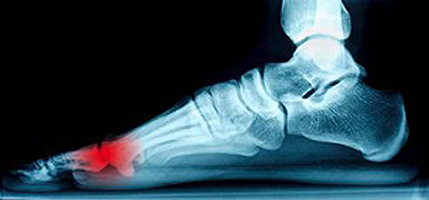 The sesamoid bones are located in the tendon that aids in moving the big toe. One of the several functions of these types of bones is to help support the body’s weight. If the area surrounding these particular bones should become inflamed, a condition that is referred to as sesamoiditis may occur. This may be the result of a sudden injury or gradual loss of strength in the bones. The pain is typically felt in the ball of the foot, and the inflammation may extend to the inside of the arch. It may commonly be observed in young people who are physically active, in addition to runners and ballet dancers which may occur due to the amount of force that the sesamoid bones must endure. Some of the symptoms that may be connected with this condition may include bruising, swelling, or difficulty in straightening the big toe. If you feel you may have sesamoiditis, please schedule a consultation with a podiatrist who can provide a correct diagnosis in addition to discussing correct treatment options.
The sesamoid bones are located in the tendon that aids in moving the big toe. One of the several functions of these types of bones is to help support the body’s weight. If the area surrounding these particular bones should become inflamed, a condition that is referred to as sesamoiditis may occur. This may be the result of a sudden injury or gradual loss of strength in the bones. The pain is typically felt in the ball of the foot, and the inflammation may extend to the inside of the arch. It may commonly be observed in young people who are physically active, in addition to runners and ballet dancers which may occur due to the amount of force that the sesamoid bones must endure. Some of the symptoms that may be connected with this condition may include bruising, swelling, or difficulty in straightening the big toe. If you feel you may have sesamoiditis, please schedule a consultation with a podiatrist who can provide a correct diagnosis in addition to discussing correct treatment options.
Sesamoiditis is an unpleasant foot condition characterized by pain in the balls of the feet. If you think you’re struggling with sesamoiditis, contact one of our podiatrists of Family Foot and Ankle Care of Moriches. Our doctors will treat your condition thoroughly and effectively.
Sesamoiditis
Sesamoiditis is a condition of the foot that affects the ball of the foot. It is more common in younger people than it is in older people. It can also occur with people who have begun a new exercise program, since their bodies are adjusting to the new physical regimen. Pain may also be caused by the inflammation of tendons surrounding the bones. It is important to seek treatment in its early stages because if you ignore the pain, this condition can lead to more serious problems such as severe irritation and bone fractures.
Causes of Sesamoiditis
- Sudden increase in activity
- Increase in physically strenuous movement without a proper warm up or build up
- Foot structure: those who have smaller, bonier feet or those with a high arch may be more susceptible
Treatment for sesamoiditis is non-invasive and simple. Doctors may recommend a strict rest period where the patient forgoes most physical activity. This will help give the patient time to heal their feet through limited activity. For serious cases, it is best to speak with your doctor to determine a treatment option that will help your specific needs.
If you have any questions please feel free to contact our offices located in Moriches and Shirley, NY . We offer the newest diagnostic and treatment technologies for all your foot and ankle needs.



